
Get to know the genet, a little-known nocturnal predator
little known that inhabits the entire Iberian Peninsula.
Name
- Scientific name: Genetta genetta
- Spanish: Jineta / Gineta / Gato almizclero
- Catalan: Geneta comuna / Gat mesquer / Mosqueta / Ginesta
- Basque: Katajineta arrunta
- Galician: Xeneta / Rabilongo / Gato algario / Rabisaco
Classification
The genet is not a cat. And he is not even from that family.
- Class: Mammal
- Order: Carnivores
- Family: Viverrids
- Species: Genet
Genet distribution map

Map Key:
- Dark gray: Original distribution
- Light gray: Area where the genet has been introduced by humans.
The genet originally inhabited Africa and part of the Arabian Peninsula.
It arrived at the Iberian Peninsula more than 1,000 years ago. Its population has spread throughout the peninsula and the Balearic Islands. But it also inhabits a large part of France.
Degree of protection of the genet
Worldwide

In Spain
- Although the genet is not an animal native to our country, it has been incorporated without problems and today we consider it a native animal.
- The genet is an animal with a stable population.
- No hunting is allowed.
- We cannot harm them in any way even though they do not count as a protected species.
- Their capture is prohibited.
Nutrition
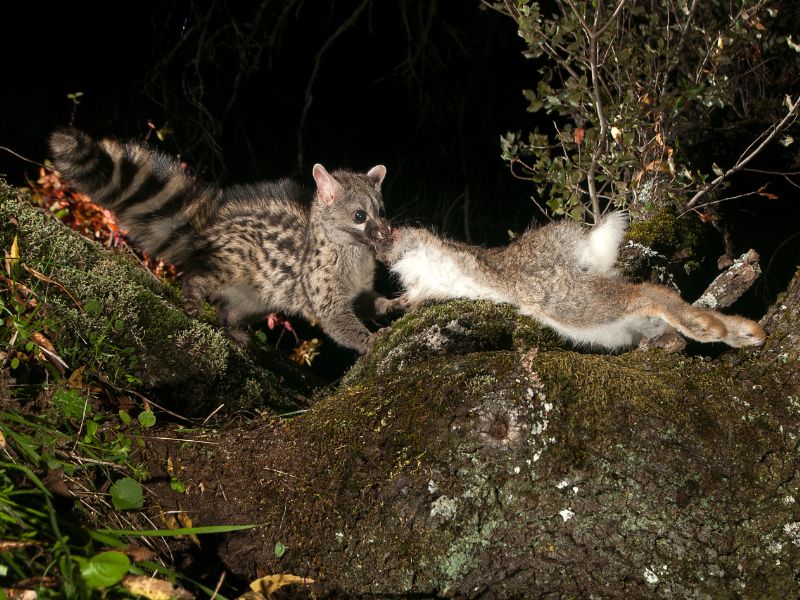
The genet is carnivorous
They are nocturnal predators. Their main diet is mice.
The genet is an opportunist
It adapts easily and expands its diet with:
- Chicken coops
- Rabbits and hares
- Reptiles and amphibians
- With food shortages even insects, snails and fish.
Habitat
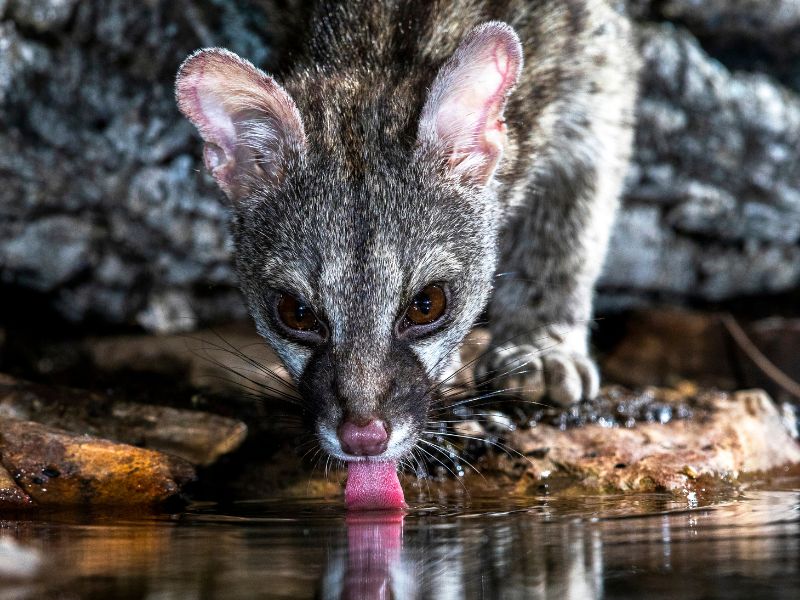
Genets prefer densely vegetated areas. But they also lives in olive groves. It is because they tolerate being close to human settlements.
The distribution extends up to 3,000m above sea level.
They avoid dense rainforest and extremely arid regions.
Customs of the genet

They are nocturnal and shy animals. During the day they sleep in hiding places, at night they go hunting. They are excellent jumpers and climbers.
Their long tail allows them to swing high up in the trees and gives them impulse when they jump from one branch to another.
What sounds do genets make?
Genets make sounds similar to those of cats: they growl when excited, hiss to threaten, purr when comfortable, and meow.
Family and social life
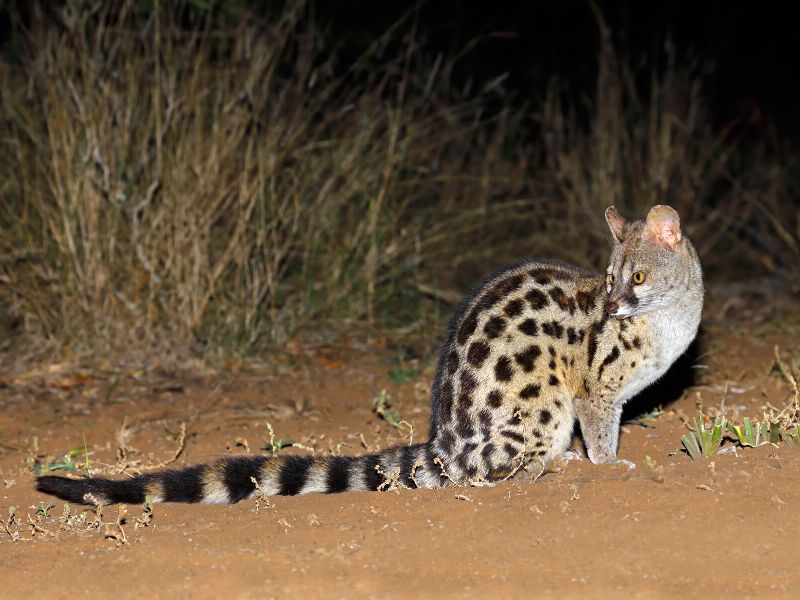
They usually live alone. During the mating period they leave their territories in search of a couple.
Their mating ritual is bloodthirsty. The male ferociously attacks the female. The female fights against the male. It is because she needs to ensure that the father of her young is strong so that they have favorable genetics to survive.
Once the work is done, the paths part.
After ten to twelve weeks, two to four babies are born, cared for by the mother alone. The little ones accompany their mother for a year.
Genets and humans throughout history

Muslims:
The Arabs used the skin of the genet to cover the saddles of horses. Nowadays genets are kept as pets in some homes in Africa.
Romans:
Already in Roman times they had genets as pets. This is likely to have caused their expansion throughout Europe.
Merchants and pirates
Genets accompanied sailors on sea voyages. It is because their agility and desire to hunt mice made them very valuable for protecting food along the way.
The genet in Spain
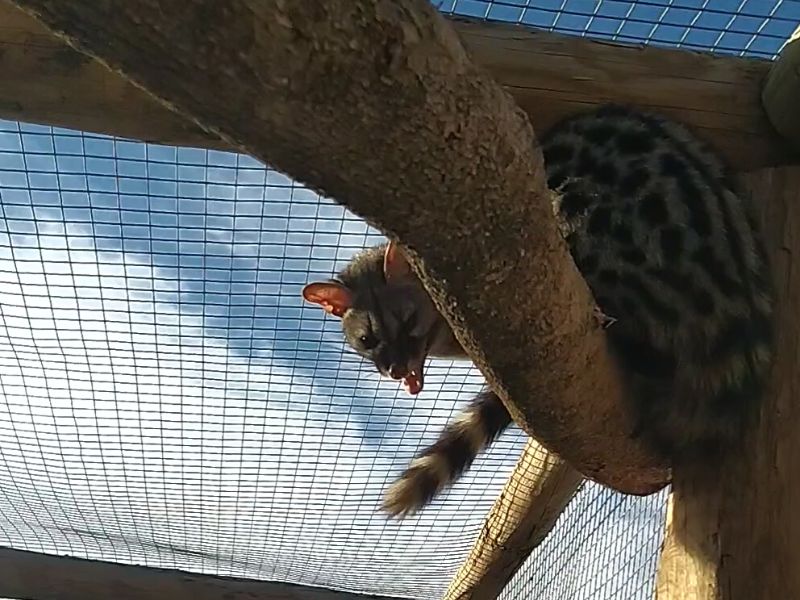
Native species
Although the genet is not native to our country, it has been perfectly incorporated into nature. Today we consider it a native species. It means: species of the country.
Damage to chicken coops
This agile, nocturnal predator can invade chicken coops and cause extensive damage. Unfortunately this leads to the poisoning of the genets. Illegal traps are also set.
Poisoning is the cruelest way to end the life of a living being. Also traps cause terrible injuries to animals.
What to do if you have problems with a genet?
Protect your chickens the way it’s always been done: lock them in the coop for the night. And above all make sure there are no holes. A genet can pass through holes 6cm in diameter.
The genet in captivity
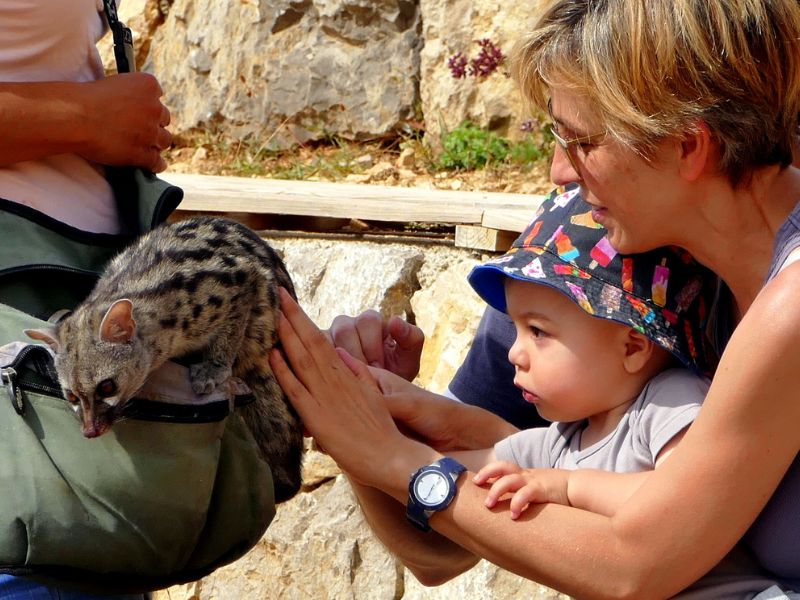
Can you have a genet as a pet?
Genets are wild animals, therefore you cannot take them from the wild and bring them home as pets.
Nevertheless:
There are approved breeding centers where they legally breed genets. You can buy a genet from an official breeder. In this case, however, you will have to legalize its possession with the administration.
Are genets good pets?
No.
They are animals with an immense need to move. They also stink, and a lot! Their teeth are strong and sharp and their claws are like knives. And believe me, they use them. They are definitely not animals to be kept as pets in a home.
